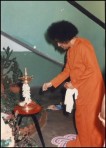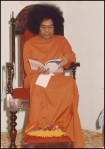A True Offering To Sathya Sai Baba
A few years ago at the time when preparations were being made to begin the construction of the Super Speciality Hospital, Bhagawan Sri Sathya Sai Baba seemingly had less time to devote to the students. Day and night He was busy with matters relating to the new hospital. Every evening immediately after darshan Bhagawan would call a group of doctors for an interview and He would discuss with them matters relating to the new hospital, even the most minute details, as this was to be a model hospital. Bhagawan would come out of the interview room only after the evening bhajans had commenced and thus the students did not have much of an opportunity to interact with Bhagawan during this period. Previously after the evening interview Bhagawan would come out and speak to the students and guide them, but this wasn’t possible at that time as Bhagawan was extremely busy. There was one very young student of Bhagawan who could no longer bear the pangs of separation from his mother Sai. He wrote a letter to Bhagawan one day and took it during evening darshan but unfortunately he was sitting a few rows back. When Bhagawan came to his side this boy got up and offered his letter to Bhagawan. Bhagawan stopped, leaned over and made a special effort to take this young boy’s letter.
To say the least this boy was ecstatic. Then the darshan continued and as usual Bhagawan called a group of doctors for an interview. All the students were depressed as they felt they had been deprived of the love of their mother Sai yet another day. Then, after about five minutes, to everyone’s utter amazement, the interview room door flew open and Bhagawan emerged in all His glory holding a small letter in His hand, the letter of the young boy. Bhagawan called that young boy to come near and asked him, “Boy, should I read aloud what you have written to me in this letter, so that everyone may listen.” The innocent boy replied. “Whatever you think or wish, Bhagawan” Bhagawan himself read the letter aloud so that all could hear. The letter was as follows:
Dear Bhagawan,
You have given so much to me and to every one here. You have provided free education for me and all my brothers and now I hear that you are constructing a BIG Hospital that will provide the most modern health care facilities to every section of the society totally free of cost. Bhagawan! I also want to be a part of your glorious mission but I am just a small boy and I don’t know how I can contribute. Bhagawan, my parents are extremely poor but in spite of that they send me a little extra pocket money every month. I know it’s due to their love and concern for me.
Bhagawan! For the last three months I have not given my clothes to the dhobi. While all other boys were sleeping in the night I washed my clothes and thus I managed to save a little money. Bhagawan! I have also resisted the temptation of toffees, chocolates and all other things and thus managed to save a little money. Bhagawan! I offer this 100 rupee note to you. I feel ashamed and small to give you so little but even if this money can be used to buy a small brick for the foundation of the new hospital, I will be the happiest child in the world.
Your loving Son.
You know the twinkle in the eye of a mother when her son does something that makes her feel extremely proud. Well, that twinkle was there in Bhagawan’s eye. Holding the 100 rupee note in His hand, Bhagawan said to that young boy. “My dear son, this is not just 100 rupees, this note is worth millions and millions of rupees for Me.”
What do we learn from this? In God’s kingdom power, wealth, position and status are of no importance whatsoever. God only looks to see whether our heart is pure. For, had God looked at the magnitude of one’s sacrifice, would Lord Rama accept the jungle fruits from the hands of Sabari and relish them, would Lord Krishna accept the banana peels instead of the bananas from the hands of Vidura and feast on them and would Bhagawan leave aside a group of highly educated doctors in the interview room and come and spend the time with this young boy? God only searches for our love and devotion.
Just before the war Arjuna was full of doubt but after receiving the message of Lord Krishna all his doubts vanished, his delusion was removed, he regained his memory and he told LORD KRISHNA: “KARISHYE VACHANAM TAVA” “I will do as you tell me”. The same principle holds good for our sports meet as well. Bhagawan guides us, inspires us, and mentions to us how the sports meet should be conducted. From then onwards all the students, right from primary to P.G. level, spare no efforts in fulfilling Bhagawan’s wish, even if it means foregoing sleep, food and comfort. The students don’t mind at all. The work done is thus transformed into worship because in everyone’s mind there is only one thought and that is to please Bhagawan Sri Sathya Sai Baba.
Filed under: ahimsa, Bhagavan, Bhagavan Sri Sathya Sai Baba, Bhagawan, Bhagawan Sri Sathya Sai Baba, Dharma, Heart To Heart, Prema, Sai Baba Of India, SaiBaba, Sathya Sai, Sri Sathya Sai | Tagged: Charity, God, Goodness, Hospital, Humanitarian, India, Innocence, Love, Peace, Purity, Sacrifice, Sai Baba, sathya sai baba, Selflessness | Comments Off on A True Offering To Sathya Sai Baba










You must be logged in to post a comment.